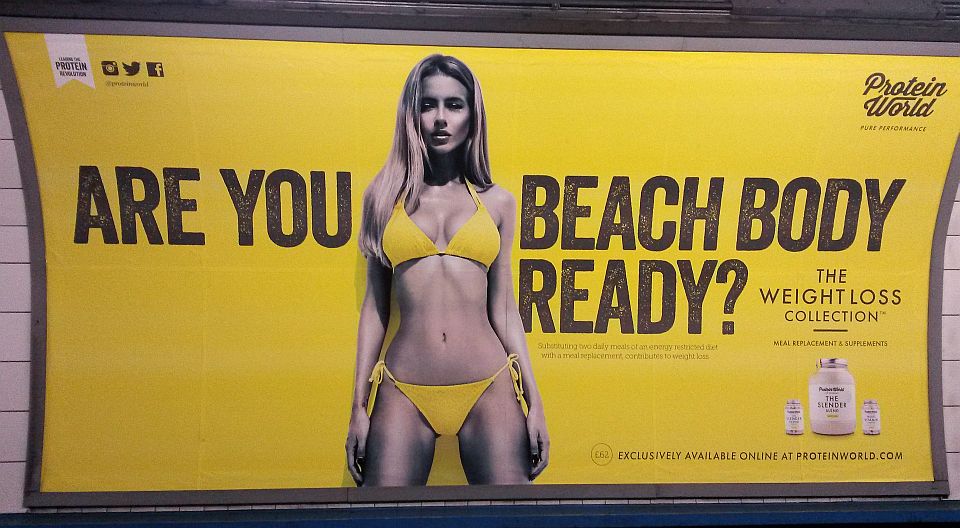We are not Sadiq’s little girls
The mayor’s ban on body-shaming adverts is an insult to women.

Want unlimited, ad-free access? Become a spiked supporter.
Newly elected London mayor Sadiq Khan made headlines this week with his plans to transform London transport. No, he wasn’t fulfilling his manifesto promise to freeze fares (apparently, he only intended to freeze fares for single tickets, not fares for all tickets), but by pledging to ban from London’s transport network ‘adverts that could cause body-confidence issues’.
‘As the father of two teenage girls’, said Khan, in defence of the proposed ban, ‘I am extremely concerned about this kind of advertising, which can demean people, particularly women, and make them ashamed of their bodies. It is high time it came to an end.’ It seems that Khan, who claimed in the run-up to the mayoral election that his daughters had turned him into a ‘proud feminist’, is now using his daughters to formulate policy, in this case, giving the transport network a new, body-confident look.
Several eating-disorder charities have come out in support of the ban. Beating Eating Disorders (Beat), which was part of the campaign last year to ban Protein World’s infamous ‘beach body ready’ adverts from the Tube, emphasised ‘how toxic images could be to an individual’. The government’s former mental-health tsar, Natasha Devon, celebrated Khan as the ‘hero of the day’.
The fact is that there is no evidence that adverts featuring skinny women in various states of undress adversely affect women’s mental health. There is only the claim, made by weight-obsessives, that such images make women feel bad. The Advertising Standards Agency investigated the Protein World advert, which caused such controversy last year, and ruled that it was neither ‘offensive nor irresponsible’. Yet regardless of the facts, Khan is going ahead with his plan, which means that adverts deemed to be body-shaming or promoting unrealistic images of women will no longer be allowed on London transport.
Khan’s move is extremely patronising – he has made a decision on behalf of millions of women on the basis of the feelings of his teenage daughters. Not only does the ad ban treat adult women like teenage girls; it also rests on a crude pop-psychology analysis of the effect of images on women’s mental health.
The ban has prompted a significant outcry, and many have come out in defence of free speech, including the freedom to use images and words – in other words, adverts – to persuade people to buy certain products. But the ad ban is not just an infringement on freedom of speech; it’s also an attack on women, on our ability to be rational, independent agents in society. Khan’s ad ban rests on the assumption that life should be made easier for women, that policymakers should lay the proverbial coat over the puddle for women, so that they don’t have to deal with the muddy, difficult aspects of life.
Why should life for women be forcibly rendered sweet and cosy? What many body-confidence campaigners don’t realise is that shielding women from pictures or words that make us feel uncomfortable comes at a high price. If we support an external authority filtering public life for women’s consumption, we relinquish our status as strong independent women – we’re accepting the role of damsels in distress.
Khan may have taken the lead with this particular ban, but, in doing so, he’s merely following the trail blazed by contemporary feminists who have long been trying to protect women from everyday life. This belief that women are incapable of dealing with the pains and stresses of life underpins many of today’s feminist campaigns: ending ‘rape culture’ by banning rude jokes and songs at university; fighting misogyny by banning topless women from newspapers; calling for women to be let off work during their periods; closing the gender pay-gap through positive discrimination and gender quotas; and battling anorexia by banning a few pictures of skinny women. All of these quasi-political campaigns undermine the properly feminist idea that women are as capable as men of being free agents.
But women are not paper dolls. If we are exposed to difficult situations, we don’t fall apart. For some women, a skinny body is a reminder of something they’re not. I often get that feeling when listening to my favourite singers, or reading great novelists. Sometimes you just have to accept that there are people out there with more talent or beauty than you. Should we ban everything that makes us feel competitive, everything that doesn’t promote a sense of immediate self-worth?
The funny thing is, the feminists who are usually vocal about protecting women from harm have stayed quiet about Khan’s ban. That’s because they realise that this is the logical, censorious outcome of a feminism that demands women be seen as weak. In Khan, we now have a short, middle-aged man managing our self-esteem. But he’s not reached this position by himself. He has been bolstered by years of reactionary feminist arguments.
Instead of cowering from uncomfortable situations, women must stand up and prove that that we are equal to men in strength and resolve. If you’re insecure enough to let a picture of a skinny woman make you feel bad, bin the chocolate bar – or, better still, eat two with relish and laugh at the miserable idea of powdered protein for lunch. Just don’t go crying to Sadiq. We’re not his little girls.
Ella Whelan is assistant editor at spiked. She will be speaking at the De Beauvoir Balloon Debate, Britain, Europe and the EU on Wednesday 22 June. Follow her on Twitter: @Ella_M_Whelan
Picture by: Getty
You’ve hit your monthly free article limit.
Support spiked and get unlimited access.
Support spiked and get unlimited access
spiked is funded by readers like you. Only 0.1% of regular readers currently support us. If just 1% did, we could grow our team and step up the fight for free speech and democracy.
Become a spiked supporter and enjoy unlimited, ad-free access, bonus content and exclusive events – while helping to keep independent journalism alive.
Monthly support makes the biggest difference. Thank you.











Comments
Want to join the conversation?
Only spiked supporters and patrons, who donate regularly to us, can comment on our articles.